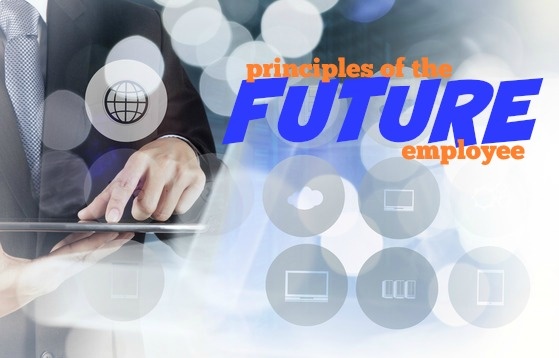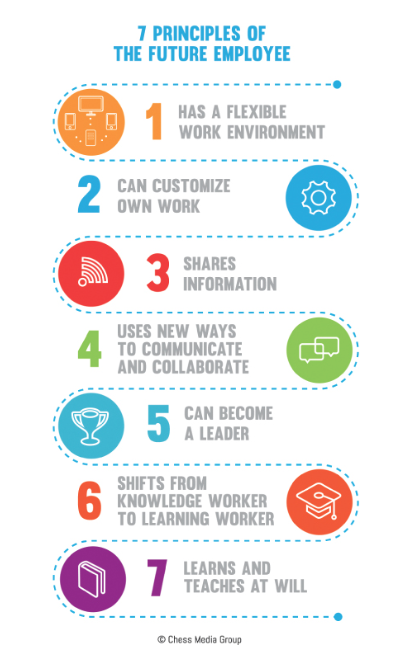Today’s workplace is on the verge of a leadership substitution where existing leaders will be replaced by workers with new ideas, expectations, approaches, and strategies. 63.3% of U.S. executives will be eligible to retire in the next 5 years and 33% are currently eligible to retire. In addition, in 2013 87% of Millennial workers took on management roles, versus 38% of Generation X and 19% of Baby Boomers.
Regardless if you are 22 or 72, employees that will thrive tomorrow are those that will embrace new attitudes about work and accept new styles of working. In the book, The Future of Work: Attract New Talent, Build Better Leaders, and Create a Competitive Organization, Jacob Morgan explores the principles of the future employee. Highlighted below are three of the principles.
Customized work.
The future employee will expect to be able to customize their work. Customized work will be an expectation for Millennials who grew up in an age of customization. Customized work allows employees the freedom to develop their careers and un-pigeonhole themselves. Employees will no longer climb the corporate ladder but rather will create the ladder. Dynamic work customization could be the differentiator organizations need to continue to innovate in our competitive, perpetual beta culture.
Many organizations are adapting a hybrid freelancer environment where employees leverage collaboration platforms and internal social networks to see what projects are available and select the ones they want to participate in or create their own. Technology has empowered employees to participate in conversations they are passionate about, share the projects they are working on, and contribute towards what they care about.
Deloitte has created a Mass Career Customization program that allows employees to change their work preferences such as how many hours you can work a certain week, where you want to work, how often you want to travel, what projects you want to work, etc.
At Treehouse, employees completely customize their work by controlling what they work on. Every employee has the ability to submit and create a new project or to join a project that someone else is working on. If a project doesn't get enough support it's “abandoned.”
Can become a leader.
The perspective of leadership will continue to shift as more Millennials assume leadership roles within organizations. However, no longer is leadership reserved for the appointed few at the top of organizations. Leaders are no longer appointed but rather leaders rise based on building a following (something Millennials have been practicing since the dawn of Facebook). Today’s social technologies enable every employee to become a leader.
The more active an employee is in internal collaboration platforms the more likely they are to become influential leaders. Morgan warns us to “keep in mind that just because you share doesn’t make you a leader, but it gives you the opportunity to become one if your peers and coworkers start to respect, understand, and follow you and the content you are creating.”
In the future workplace, employees have a voice and a choice to become leaders.
Related Read: The Inevitable Entrepreneurship Evolution, How Millennials And Generation Z Will Demand A New Kind Of Leadership
From knowledge worker to learning worker.
With the world’s knowledge a simple search away, knowledge and experience are no longer the primary commodity. Morgan says “Far more valuable is to have the ability to learn and to apply those learnings into new and unique scenarios. It's no longer about what you know, it's about how you can learn and adapt.”
Thomas L. Friedman stated his agreement in “Need a Job? Invent It,” a March 2013 column for the New York Times: “What you know matters far less than what you can do with what you know. The capacity to innovate—the ability to solve problems creatively or bring new possibilities to life—and skills like critical thinking, communication and collaboration are far more important than academic knowledge.”
As learning curves approach faster and become steeper at work, embracing an adaptive learning style will be critical for future employees.
The 7 Principles of the Future Employee according to Jacob Morgan...
Question: What other employee shifts have you noticed in the workplace?
Consider Ryan to be your next keynote speaker by clicking here...
![]()







